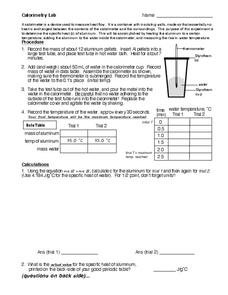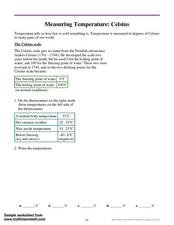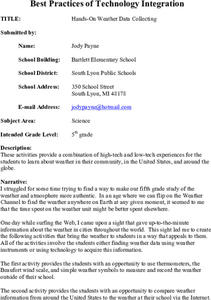Curated OER
Weather Graphs
First graders use their knowledge of weather symbols to organize and construct a graph of the daily weather for one month. Each student have a chance to give the daily weather report using Sammy's Science House Computer Software.
Curated OER
Conductive Heat Transfer Experiments
Learners conduct a variety of experiments to see how heat is transferred using common household objects. The teacher uses the safety plans included in the lesson plan. This is ideal for inexperienced Science teachers.
Curated OER
Weather: Like It or Not!
Second graders investigate daily weather changes. In this earth science lesson, 2nd graders identify the different terms used to describe weather. They use the outdoor thermometer to record data.
Curated OER
Farming: Natural Resources (Lesson 2)
Students identify the types of natural resources. They explain the difference between weather and climate. They practice using a rain gauge and reading a thermometer.
Curated OER
Calorimetry Lab
In this calorimetry lab, students apply the information read about a calorimeter to conduct a scientific investigation. Students record their data in a chart. Students use the information from the chart to calculate specific heat of...
Curated OER
Natural Refrigeration
Students build a refrigerator that does not require electricity. In this environmental science activity, student consider desert dwellers of Africa who have no access to electricity. Students use flower pots, sand and water to study the...
Curated OER
Measurement Temperature: Celsius
In this Celsius learning exercise, students review the Celsius scale and then mark temperatures for the first thermometer. Students then study the temperatures on the thermometers and write the temperatures.
Curated OER
Scientific Tools
Students list different uses for common scientific instruments. They identify appropriate instruments to measure length, temperature, and mass. Pupils are given a copy of the "Science Tools" task sheet, students place the correct number...
Curated OER
Hot Rocks
Learners demonstrate that setting of plaster and cement is a change, which involves a release of heat energy, use data collected experimentally to construct comparison graphs and analyze the graphs to make predictions about future...
Curated OER
Hands-On Weather Data Collecting
Fifth graders use Internet sites to complete a study of weather and atmosphere. They compare weather data from cities around the world. They use thermometers, the Beaufort wind scale, and simple weather symbols to measure weather around...
Curated OER
Color Me Hot
Seventh graders use the scientific method, to observe, record and analyze the data they gathered. They make observations using their five senses. Students compare, contrast and draw conclusions based on the observations and data...
Curated OER
Hot Friction
Sixth graders use small electronic devices known as thermistors to measure the temperature beneath an object such as a coffee cup as it slides across a surface. By choosing different surfaces, 6th graders can compare in a quantitative...
Curated OER
Forecasting Weather
In this weather worksheet, students conduct an experiment where they record the weather observations for a week. Then they determine the air pressure using an aneroid barometer and estimate the amount of sky covered by clouds. Students...
Curated OER
Was Goldilocks Telling the Truth?
Sixth graders explore the movement of heat between objects. For this heat lesson, 6th graders use the scientific method to conduct guided experiments regarding conduction, convection, and radiation.
Curated OER
Exothermic Rehydration of Gypsum
Learners observe exothermic reactions in the lab using plaster. In this chemistry lesson, students collect data from their experimental set up every five minutes. They explain the different stages in the hardening of plaster.
Curated OER
Transforming Food Energy: A Balancing Act
Students explain their role as consumers. They use a purchased calorimeter or make their own simple calorimeter to measure the energy content in selected foods. This interesting activity really gets students thinking about what they eat.
Curated OER
To Every Thing There Is A Season...
Students use the artwork by Robert Harris to examine the four seasons. In groups, they identify the clothing worn in the artwork and create a dance which resembles the painting. They also practice reading a thermometer and identify...
Curated OER
Salinity
Learners define and discuss salinity, conduct classroom experiment to determine salinity of water sample by using hydrometer, record predictions, and demonstrate understanding of how salinity influences object's ability to float in water.
Curated OER
Energetic Citizenship
Middle schoolers analyze how to use less energy. In this energy conservation lesson, students discuss fluorescent and incandescent light bulbs and experiment to examine the energy of both sources using thermometers. Middle schoolers...
Curated OER
I Can See and Feel the Change in the Seasons
Students use their senses to investigate changes in the seasons. Identify the seasons and represent each with pictures and songs. Observe and describe typical weather for each of the seasons. Describe the information each of the five...
Curated OER
Measuring Weight, Mass, and Capacity
Second graders measure weight, mass, and capacity. In this measurement lesson, 2nd graders model how to measure amounts of liquid by using containers that measure one cup, one pint, and one quart. Students compare the mass of each...
Curated OER
Big on Blubber: How do Whales Stay Warm?
Learners explore biology by conducting a science experiment in class. In this whale anatomy lesson, students identify the use of whale blubber for the animal to stay warm in cold waters while utilizing ice, vegetable oil, plastic bags...
Curated OER
Insulators, Conductors, and Energy Transfer
Third graders conduct experiments to determine what types of material make good insulators. They prepare a graph of time vs. temperature for their sample. They choose a graph using each kind of material to display for class analysis and...
Curated OER
Cool Suits
Students examine the materials that are used to make space suits. They complete an experiment in which they test different materials in different colors to determine the best one for keeping astronauts comfortable. They analyze the data.

























